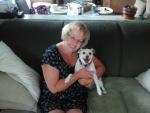15 Month Update - Scan Results - Sutent Patients Take Note

Hi, All.
I always feel the need for apologizing when I post to the board. I should be on here more, I can add more value. I will try to do better at that, but I do make sure that at significant moments that I update you all. I promise to do that at minimum, and welcome any one of you to contact me via email. I believe you can do that via the profiles page.
History for those who don't know me. 43, M, dad to 2 girls (8 and 12), Diag. 3/2012 mRCC Grade 4 Stage 4 with numerous mets to other kidney, both adrenal glands, lymph nodes, spleen and worst, what was characterized as "innumerable lesions to the lungs". Had surgery 5/25/12 to remove left kidney and assorted other parts. Started Sutent 50 mg 4 on 2 off around July, 2012, so I'm on my 10th or 11th cycle.
Had my scan yesterday and I was declared stable! Yay! Now, again for those who don't know me . . .
My last scan 4 months ago showed Stable with some improvement. "Stable" on that scan referred back the prior scan, 3 months earlier, which showed, or more importantly did NOT show any evidence of mets in my right kidney or my lungs. My lungs were declared "normal" by the radiologist. The mass long my spine had shrunk to a "flat thing, like a little pancake" and the last remaining met was in my right adrenal gland, which was stable at 1.2 x 1.0 cm.
Median for me was 8 months. That was well over a year ago that I was diagnosed. Believe me, I'm nowhere near death. In fact, my Oncologist at MSK is researching next steps for me, be that because the Sutent stops working or because he's confident he can significantly improve my state or possibly CURE me. Last time he specified a time frame, he said 3 to 4 years. That was six months ago. He says the cure will be in immuno-therapy.
I have no doubt that with the amazing speed of progress in RCC research and treatments, and courageous doctors and patients, no, survivors, driving together towards a cure; continuing to stay positive and confident that this is passing and will soon be behind me; and faith, my own but much more so those around me. So important to build your team and not do it alone, then we will see the day when we're all just friends, and not joined only by cancer.
All the best, warmest thoughts and prayers,
Vin
Long Island, NY
Comments
-
Your Jouney
Vin,
Congradulations on your journey so far. I feel so inadaquate comparing my journey to yours. All I did was have this not so fun surgery with everything pointing to a full recovery. You have showed what can happen where you start with some really tough baggage and a terrilble diagnosis. Keep it up, You and Fox and others are the real heros on this board.
Icemantoo.
0 -
Congrats!
Very happy to hear of your continued good results!
0 -
More welcome newsMikeyswife said:Congrats!
Very happy to hear of your continued good results!
Great stuff, Vin. I had you marked from the outset as someone who would do well and as someone who deserved to do well! You've really worked at it and maintained a good mind-set. That, coupled with youth, strength and the most powerful motivation - young family - will ensure that you keep on doing well.
Thanks for quoting the cheering comments from your Oncologist - if I remember correctly, he said something similar earlier on in your journey.
0 -
Vin, great news.. we loveTexas_wedge said:More welcome news
Great stuff, Vin. I had you marked from the outset as someone who would do well and as someone who deserved to do well! You've really worked at it and maintained a good mind-set. That, coupled with youth, strength and the most powerful motivation - young family - will ensure that you keep on doing well.
Thanks for quoting the cheering comments from your Oncologist - if I remember correctly, he said something similar earlier on in your journey.
Vin, great news.. we love it..! Talk about a huge turn around..! Keep up the great results..!
Ron
0 -
Hi Vin
Just woke up it"s 5:00 am in Chicago and i was feeling a little crappy due to lack of sleep combined with the dogs waking me up around 3:00 am to let them outside.Well i have just read your post and trust me this was much more uplifting than a cup of coffee,i must say i am very happy for you and your family given the latest scan report.Oh time to go make the coffee and get ready to go to work,take care Vin and try to log on more often.
0 -
Atta boy!!!
Vin,
In the fall of 1999 my father-in-law was diagnosed and in a very similar situation to yours, at that time there was nothing they could do but keep him comfortable. He was gone late June 2000. My how things have changed, you are part of a group that gives hope where none existed, you shine brightly where once was only darkness, you are among the **** kickers that so many need to hear more from. True warriors like you are held in high esteem here for people like me know that if the battle comes our way again it is you who has forged a path before us, your value is immeasurable.
Gary
0 -
Way to go Vin!
I am happy beyond words for you. Whatever you're doing, keep doing it! And keep posting with news like this. Continued blessings for you and your family.
Peg
0 -
Very good news
And thank you for sharing this update with us.
Your post brought something to mind btw, maybe some of the wiser or experienced members can answer:
I have often heard and read about IL-2 treatments which lead to reduction or removal of mets, and then onwards to surgical removal of remaining mets, curatively intended.
I have however never encountered it in conjunction with, for example, sutent (or similar). Is that "path" towards long term durable response/"cure" for some reason not viable except in conjunction with IL-2?
/G
0 -
Very good newsGalrim said:Very good news
And thank you for sharing this update with us.
Your post brought something to mind btw, maybe some of the wiser or experienced members can answer:
I have often heard and read about IL-2 treatments which lead to reduction or removal of mets, and then onwards to surgical removal of remaining mets, curatively intended.
I have however never encountered it in conjunction with, for example, sutent (or similar). Is that "path" towards long term durable response/"cure" for some reason not viable except in conjunction with IL-2?
/G
I believe that the correct answer to your question is that the jury is still out. The targeted therapies are still too new for us to reach a rational assessment, particularly since the optimal administration for each drug has yet to be established. Happily, we're continuing to make marked improvements in the use of these drugs so the situation you're speculating about - that we may have additional 'cures' on our books already - could well become reality.
It's striking that IL2 itself is receiving fresh attention because the response rate is being improved as we learn the best ways to use it and who to use it for. It's been side-lined because of the far better response rates of drugs like Sutent and maybe will continue to be overshadowed if the new therapies start looking like possible cures for some patients. And then, of course, the newest immunomodulators (nivo, ipi etc) may blow the TKIs and mTORs out of the water quite soon - wouldn't that be nice?! The entire scene is beginning to look a lot more promising.
0 -
Way to go Vin!Texas_wedge said:Very good news
I believe that the correct answer to your question is that the jury is still out. The targeted therapies are still too new for us to reach a rational assessment, particularly since the optimal administration for each drug has yet to be established. Happily, we're continuing to make marked improvements in the use of these drugs so the situation you're speculating about - that we may have additional 'cures' on our books already - could well become reality.
It's striking that IL2 itself is receiving fresh attention because the response rate is being improved as we learn the best ways to use it and who to use it for. It's been side-lined because of the far better response rates of drugs like Sutent and maybe will continue to be overshadowed if the new therapies start looking like possible cures for some patients. And then, of course, the newest immunomodulators (nivo, ipi etc) may blow the TKIs and mTORs out of the water quite soon - wouldn't that be nice?! The entire scene is beginning to look a lot more promising.
Success is shared by all. And Tex, who would bet against me and the IL-2? I think I'm on the 5 year plan. I should be one of those who the IL-2 is best targeted for.
0 -
Gracias
Terrific explanation, Nano. So concise and clear!
0 -
Sutent and other anti-angiogenic TKI'sGalrim said:Very good news
And thank you for sharing this update with us.
Your post brought something to mind btw, maybe some of the wiser or experienced members can answer:
I have often heard and read about IL-2 treatments which lead to reduction or removal of mets, and then onwards to surgical removal of remaining mets, curatively intended.
I have however never encountered it in conjunction with, for example, sutent (or similar). Is that "path" towards long term durable response/"cure" for some reason not viable except in conjunction with IL-2?
/G
Garim, as you know, Sutent and the other TKI's that target VEGF, etc. are anti-angiogenics. They work to block the signalling mechanisms that tumors send out to spark the creation of their own private (new) blood vessels. As such these drugs do not offer any promise of long-term remission. They have to be taken continuously in order to work. In time, mostly thanks to evolution, tumors can develop resistance to these drugs. They can "figure out" new pathways to signal angiogenesis. When that happens one needs to change to a different drug or consider another kind of therapy.
Immunotherapies work to remove the "cloak of invisibility" that tumors have adopted to appear to the immune system as normal cells. That is why one can have a perfectly healthy and effective immune system - but one that does nothing against cancer.
IL-2 therapy uses high doses of a cytokine to "shock" the immune system back into seeing the tumors for what they are. When they work they also bring along another unique trait of our immune system - long term memory. The immune system mechanism can remember what worked to defeat the tumors. Therefore - in those cases of complete long-term response - the immune system is successfully remembering and fighting any residual cells that are still circulating in the blood stream or hiding dormant in other tissues.
Sutent is being tried in clinical trials in conjunction with anti-PD1 (Nivolumab) to see if it can help broaden the base of patients who will respond to it.
0 -
Congratulations!
That's amazing news, good on ya! (That's what the Australians say...I've picked up a few phrases after living there for 2 years)
thank you for sharing your story with us, all these new medications have shown tremendous amounts of improvement!
my mom is also being seen at msk, do you mind me asking who your medical oncologist is? My mom is seeing dr.mortzer and she is starting her votrient the first week of september.
nanosecond, thank you also very much for a thorough explanation of the different medications.
0 -
Im aware of how anti-angiogenics worksNanoSecond said:Sutent and other anti-angiogenic TKI's
Garim, as you know, Sutent and the other TKI's that target VEGF, etc. are anti-angiogenics. They work to block the signalling mechanisms that tumors send out to spark the creation of their own private (new) blood vessels. As such these drugs do not offer any promise of long-term remission. They have to be taken continuously in order to work. In time, mostly thanks to evolution, tumors can develop resistance to these drugs. They can "figure out" new pathways to signal angiogenesis. When that happens one needs to change to a different drug or consider another kind of therapy.
Immunotherapies work to remove the "cloak of invisibility" that tumors have adopted to appear to the immune system as normal cells. That is why one can have a perfectly healthy and effective immune system - but one that does nothing against cancer.
IL-2 therapy uses high doses of a cytokine to "shock" the immune system back into seeing the tumors for what they are. When they work they also bring along another unique trait of our immune system - long term memory. The immune system mechanism can remember what worked to defeat the tumors. Therefore - in those cases of complete long-term response - the immune system is successfully remembering and fighting any residual cells that are still circulating in the blood stream or hiding dormant in other tissues.
Sutent is being tried in clinical trials in conjunction with anti-PD1 (Nivolumab) to see if it can help broaden the base of patients who will respond to it.
But, what got me going on the subject was this(and similar articles):
http://meeting.ascopubs.org/cgi/content/abstract/25/18_suppl/15514
Which leads to my question, the rationale being that if "non-IL2" treatments can lead to long term durable response, why do we not see treatments more often followed by surgical removal of remaining mets when possible? This seems to me only to be used in conjunction with IL-2 treatments? Im probably overlooking something obvious here...
/G
0 -
Sutent and CRGalrim said:Im aware of how anti-angiogenics works
But, what got me going on the subject was this(and similar articles):
http://meeting.ascopubs.org/cgi/content/abstract/25/18_suppl/15514
Which leads to my question, the rationale being that if "non-IL2" treatments can lead to long term durable response, why do we not see treatments more often followed by surgical removal of remaining mets when possible? This seems to me only to be used in conjunction with IL-2 treatments? Im probably overlooking something obvious here...
/G
Galrim, I know you know about how Sutent works. The fact remains that only a very small percentage (I believe the current figure is about 1%) of the patients who take Sutent may get a complete response. In other words, it is very rare. Incidentally the paper you site was published back in 2007. The seems like ancient history to me.
HD IL2 is currently the only FDA approved therapy that does promise the possibility of long-term CR (complete response). Again, there is dispute about what the percentage of successful candidates are. I think it is 5-7% of ALL mRCC patients (that is the entire population - including clear-cell and non-clear cell, etc.). If you prescreen the candidates to being only clear-cell, the percentage may go up to as high as 10-15% but not much better than that. At least so far.
I am not sure why you believe that mets are only being removed surgically in those patients who undergo HD IL2. That's a new one on me. I am aware of numerous patients who have done this kind of thing almost routinely - and were not on or had ever undergone HD IL2.
Perhaps Tex some shed some further light on the subject.
0 -
Surgical removalNanoSecond said:Sutent and CR
Galrim, I know you know about how Sutent works. The fact remains that only a very small percentage (I believe the current figure is about 1%) of the patients who take Sutent may get a complete response. In other words, it is very rare. Incidentally the paper you site was published back in 2007. The seems like ancient history to me.
HD IL2 is currently the only FDA approved therapy that does promise the possibility of long-term CR (complete response). Again, there is dispute about what the percentage of successful candidates are. I think it is 5-7% of ALL mRCC patients (that is the entire population - including clear-cell and non-clear cell, etc.). If you prescreen the candidates to being only clear-cell, the percentage may go up to as high as 10-15% but not much better than that. At least so far.
I am not sure why you believe that mets are only being removed surgically in those patients who undergo HD IL2. That's a new one on me. I am aware of numerous patients who have done this kind of thing almost routinely - and were not on or had ever undergone HD IL2.
Perhaps Tex some shed some further light on the subject.
My only plan is to push removal of remaining mets after I finish with this IL-2 treatment. If there are any. My Doc has been good to me so I'll hear what she has to say too. And Yes several have had remaining mets removed who have not been on IL-2. I believe Donna comes to mind first.
0
Discussion Boards
- All Discussion Boards
- 6 CSN Information
- 6 Welcome to CSN
- 122.1K Cancer specific
- 2.8K Anal Cancer
- 448 Bladder Cancer
- 309 Bone Cancers
- 1.6K Brain Cancer
- 28.5K Breast Cancer
- 398 Childhood Cancers
- 27.9K Colorectal Cancer
- 4.6K Esophageal Cancer
- 1.2K Gynecological Cancers (other than ovarian and uterine)
- 13K Head and Neck Cancer
- 6.4K Kidney Cancer
- 673 Leukemia
- 795 Liver Cancer
- 4.1K Lung Cancer
- 5.1K Lymphoma (Hodgkin and Non-Hodgkin)
- 239 Multiple Myeloma
- 7.2K Ovarian Cancer
- 65 Pancreatic Cancer
- 490 Peritoneal Cancer
- 5.5K Prostate Cancer
- 1.2K Rare and Other Cancers
- 543 Sarcoma
- 738 Skin Cancer
- 658 Stomach Cancer
- 192 Testicular Cancer
- 1.5K Thyroid Cancer
- 5.9K Uterine/Endometrial Cancer
- 6.3K Lifestyle Discussion Boards










